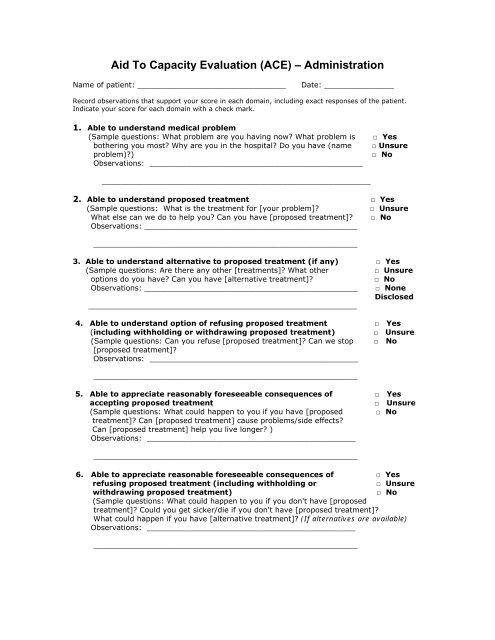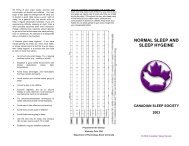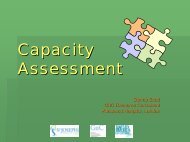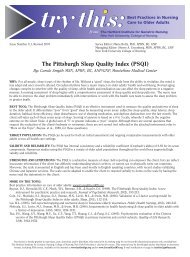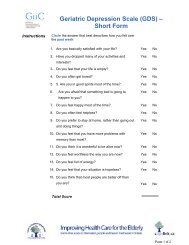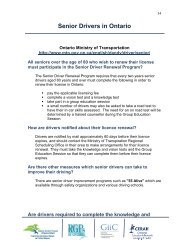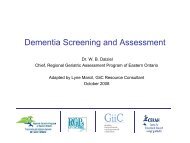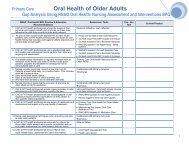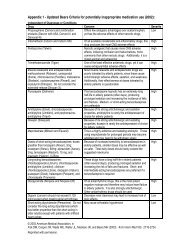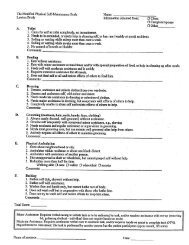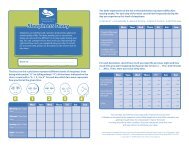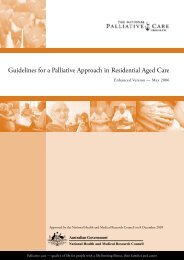Aid To Capacity Evaluation (ACE) â Administration
Aid To Capacity Evaluation (ACE) â Administration
Aid To Capacity Evaluation (ACE) â Administration
You also want an ePaper? Increase the reach of your titles
YUMPU automatically turns print PDFs into web optimized ePapers that Google loves.
<strong>Aid</strong> <strong>To</strong> <strong>Capacity</strong> <strong>Evaluation</strong> (<strong>ACE</strong>) – <strong>Administration</strong><br />
Name of patient: ________________________________<br />
Date: _______________<br />
Record observations that support your score in each domain, including exact responses of the patient.<br />
Indicate your score for each domain with a check mark.<br />
1. Able to understand medical problem<br />
(Sample questions: What problem are you having now What problem is<br />
bothering you most Why are you in the hospital Do you have (name<br />
problem))<br />
Observations: ______________________________________________<br />
□ Yes<br />
□ Unsure<br />
□ No<br />
__________________________________________________________<br />
2. Able to understand proposed treatment □ Yes<br />
(Sample questions: What is the treatment for [your problem]<br />
□ Unsure<br />
What else can we do to help you Can you have [proposed treatment] □ No<br />
Observations: ______________________________________________<br />
_________________________________________________________<br />
3. Able to understand alternative to proposed treatment (if any) □ Yes<br />
(Sample questions: Are there any other [treatments] What other<br />
□ Unsure<br />
options do you have Can you have [alternative treatment]<br />
□ No<br />
Observations: ______________________________________________ □ None<br />
Disclosed<br />
__________________________________________________________<br />
4. Able to understand option of refusing proposed treatment □ Yes<br />
(including withholding or withdrawing proposed treatment)<br />
□ Unsure<br />
(Sample questions: Can you refuse [proposed treatment] Can we stop □ No<br />
[proposed treatment]<br />
Observations: _____________________________________________<br />
_________________________________________________________<br />
5. Able to appreciate reasonably foreseeable consequences of □ Yes<br />
accepting proposed treatment<br />
□ Unsure<br />
(Sample questions: What could happen to you if you have [proposed □ No<br />
treatment] Can [proposed treatment] cause problems/side effects<br />
Can [proposed treatment] help you live longer )<br />
Observations: _____________________________________________<br />
_________________________________________________________<br />
6. Able to appreciate reasonable foreseeable consequences of □ Yes<br />
refusing proposed treatment (including withholding or<br />
□ Unsure<br />
withdrawing proposed treatment)<br />
□ No<br />
(Sample questions: What could happen to you if you don't have [proposed<br />
treatment] Could you get sicker/die if you don't have [proposed treatment]<br />
What could happen if you have [alternative treatment] (If alternatives are available)<br />
Observations: _____________________________________________<br />
_________________________________________________________
(Note: for questions 7a and 7b, a “yes” answer means the person’s decision is affected by depression<br />
or psychosis)<br />
7a. The person's decision is affected by depression □ Yes<br />
(Sample questions: Can you help me understand why you've decided to □ Unsure<br />
accept/refuse treatment Do you feel that you're being punished Do □ No<br />
you think you're a bad person Do you have any hope for the future<br />
Do you deserve to be treated )<br />
Observations: _____________________________________________<br />
_________________________________________________________<br />
7b. The person's decision is affected by psychosis □ Yes<br />
(Sample questions: Can you help me understand why you've decided to □ Unsure<br />
accept/refuse treatment Do you think anyone is trying to hurt/harm □ No<br />
you Do you trust your doctor/nurse )<br />
Observations: _____________________________________________<br />
_________________________________________________________<br />
Overall Impression<br />
□ Definitely capable □ Probably capable □ Probably incapable □ Definitely incapable<br />
Comments:<br />
(for example: need for psychiatric assessment, further disclosure and discussion with patient<br />
or consultation with family)<br />
The initial <strong>ACE</strong> assessment is the first step in the capacity assessment process. If the <strong>ACE</strong> is definitely or<br />
probably incapable, considerable treatable or reversible causes of incapacity. Repeat the capacity<br />
assessment once these factors have been addressed. If the <strong>ACE</strong> result is probably incapable or probably<br />
capable, then take further steps to clarify the situation. For example, if you are unsure about the person’s<br />
ability to understand the proposed treatment, then a further interview which specifically focuses on this<br />
area would be helpful. Similarly, consultation with family, cultural and religious figure and/or psychiatrist,<br />
may clarify some areas of uncertainty.<br />
Never base a finding of incapacity solely on your interpretation of domain 7a and 7b. Even if you are sure<br />
that the decision is based on a delusion or depression, we suggest that you always get an independent<br />
assessment.<br />
Time taken to administer <strong>ACE</strong>: ______ minutes<br />
Date: ______________<br />
Assessor: _______________________________
INSTRUCTIONS FOR SCORING<br />
1. Domains 1-4 evaluate whether the person understands their current medical problem, the<br />
proposed treatment and other options (including withholding or withdrawing treatment). Domains<br />
5-6 evaluate whether the person appreciates the consequences of their decision. (See sample<br />
questions above.<br />
2. For domains 1-6, if the person responds appropriately to open-ended questions, score YES. If<br />
they need repeated prompting by closed-ended questions, sore UNSURE. If they cannot respond<br />
appropriately despite repeated prompting, score NO.<br />
3. For domain 7, if the person appears depressed or psychotic, then decide if their decision is being<br />
affected by the depression or psychosis. For domain 7a, if the person appears depressed,<br />
determine if the decision is affected by depression. Look for the cognitive signs of depression<br />
such as hopelessness, worthlessness, guilt, and punishment. (See sample questions above.) For<br />
domain 7b, if the person may be psychotic, determine if the decision is affected by<br />
delusion/psychosis. (See sample questions above.)<br />
4. Record observations which support your score in each domain, including exact responses of the<br />
patient.<br />
5. Remember that people are presumed capable. Therefore, for your overall impression, if you are<br />
uncertain, then err on the side of calling a person capable.<br />
University of <strong>To</strong>ronto Joint centre for Bioethics <strong>Aid</strong> to capacity <strong>Evaluation</strong> (<strong>ACE</strong>) Disclaimer:<br />
The information contained in this document is for general information only and is not intended for<br />
commercial use. It is not legal advice and is not a substitute for the advice of a qualified<br />
practitioner in your home jurisdiction. There are no warranties or representations of any kind as to<br />
this document’s accuracy or that of the materials contained in it. The members of the Joint Centre<br />
assume no liability or responsibility for any errors or omissions in this document’s contents.<br />
Joint Centre for Bioethics – <strong>Aid</strong> <strong>To</strong> <strong>Capacity</strong> <strong>Evaluation</strong> (<strong>ACE</strong>) http://www.utoronto.ca/jcb/disclaimers/ace.htm<br />
(Reprinted with permission)


